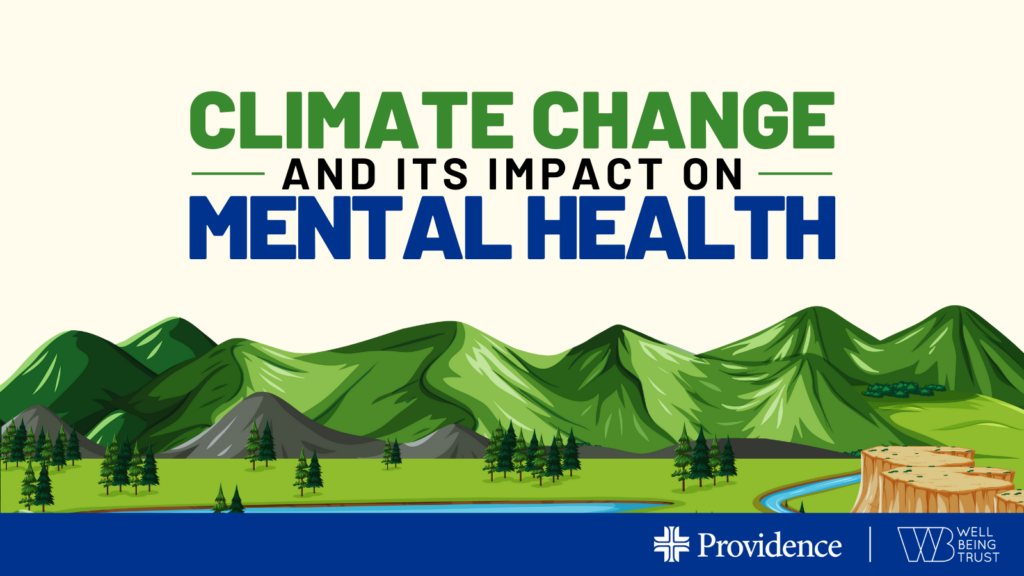Climate change can be very easy to see, from increasing temperatures to forest fires to rising sea levels. There’s also an impact we can’t always see – worsened mental health. 2023 was the hottest year on record, while demand for mental health support has never been higher. Climate change doesn’t automatically affect mental health, but it can cause great concern for those living with or without mental health conditions, and exploring how they’re connected is warranted.
“When we think about the impacts of climate change, mental health hasn’t historically been a big part of the conversation,” says Beth Schenk, Providence’s Chief Environmental Stewardship Officer.
“But many people struggle with increased anxiety and/or depression in response to the enormous changes we are seeing on our planet, and people with known mental illness may experience exacerbations. By understanding links between climate change and mental health, we can find and share solutions for people to cope with the changes, prepare for risks, and build personal and community resilience, and this can directly or indirectly improve our health.”
How is Climate Change Currently Impacting our Mental Health?
What the Research Tells Us
As shown on this graphic from the World Health Organization, climate change and mental health can be deeply connected:
Increasing temperatures year-over-year increase the likelihood of these climate hazards. Other recent findings on the impact of climate change on mental health include.
- A study published in 2024 states more than 7 million people who lived close to large wildfires in California experienced changes in mental well-being.
- Several studies found rising temperatures have been associated with suicide attempts and increased rates of mental health-related emergency department visits.
- Long-term exposure to air pollution — which the climate crisis can worsen by adding more particles from droughts or wildfires — has been linked with elevated anxiety and an increase in deaths by suicide.
Findings like these are big motivators for Providence’s environmental stewardship work, which focuses on reducing carbon emissions and creating sustainability for future generations.
The Trickle-Down Impact on Healthcare Operations
“We don’t always see the big picture links between mental health and climate change from a consumer standpoint,” says Hayley Blackburn, Environmental Analyst for Providence and Associate Professor of Pharmacy Practice at the University of Montana. “Someone who can’t get their antibiotic for their child may not know it could be due to a climate driven event on the other side of the world that is impacting our supply chain.”
Hayley points to Hurricane Maria as a key example of this. In 2017, Hurricane Maria landed in the Caribbean. Puerto Rico experienced the greatest impact and many in the country without power and clean water for several days, which was well documented.
What many may not know is Puerto Rico was a major manufacturing hub for sterile IV solution and many other pharmaceutical products, and the damage to the infrastructure and production facilities caused by Hurricane Maria created a critical shortages of a common fluid in healthcare. The stress this added to the healthcare system, Hayley says, is just one example of climate change’s impact on mental health and broader healthcare.
“The impact of climate on healthcare operations can absolutely impact mental health of patients and healthcare workers. It creates both acute and chronic stressors and can negatively impact patient care. This is combined with direct impacts on mental health more broadly and the disproportionate impacts on individuals with mental health conditions. Do we have reliable access to essential medicines? Can patients receive the care they need? This should all be part of the conversation about mental health and climate change.”
The Role of Nature in Mental Health
As noted by the American Psychological Association, exposure to nature has been linked to a host of benefits, including improved attention, lower stress, better mood, reduced risk of psychiatric disorders and even upticks in empathy and cooperation.
Naturally, as climate worsens, we face many barriers to access nature that can worsen mental health. Increased sea levels and temperatures create a risk of flooding that impacts access to rivers and parks. Wildfires greatly worsen air quality, removing the option of even going outside for some vulnerable populations while creating a general health risk for others. Even increases in heat alone warrant caution in accessing nature.
These are all risks of climate change on everyone’s mental health – meaning it’s important we explore all possibilities in stalling and reversing it.






